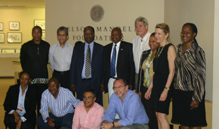
Participants at the aids2031 initiative stand together to plan a way forward for hyper-endemic countries
Dec 2, 2008 – “It’s an enormous responsibility, but there’s an opportunity to strategically influence the course of the epidemic [HIV/AIDS] in the future.”
Nelson Mandela Foundation CEO Achmat Dangor was speaking at an aids2031 strategy meeting today, aimed at finding ways to change the future for SADC countries with extremely high HIV prevalence rates.
“We’ve mapped out a plan,” said aids2031 co-chair Professor Malegapuru Makgoba from the University of KwaZulu-Natal, “that should allow us to make a significant contribution towards ameliorating the hyper-endemic prevalence, particularly with regard to Southern Africa.”
In 2007 the Nelson Mandela Foundation and the Joachim Chissano Foundation were requested to co-chair the aids2031 hyper-endemic pillar (one of nine pillars of the aids2031 initiative). The initiative looks at issues surrounding HIV/AIDS and aims to change the face of the disease by 2031 – 50 years after the first reported case of AIDS.
“The purpose of this meeting was to agree on the practical next steps,” said Mark Stirling, regional director of UNAIDS in Johannesburg. “To identify those actions which if taken now will have an impact by 2031.”
Those steps are aimed at ensuring that, as UNAIDS executive director Peter Piot pointed out, “we ask the right questions now for 2031”.
At the meeting, aids2031 identified some of these questions as: Why Southern Africa? What will be the picture of Southern Africa in 2031; how do we make sure we have the finances and resources needed? And what are the challenges facing leadership in this period?
“It was a very productive meeting,” said Piot. “The result of the meeting is that we have a good plan for 2009 and then moving forward.”
Some of the challenges facing the Southern African region and concomitantly aids1031 are the downturn in the global economy, the politically volatile nature of a number of countries in the Southern African region at present, as well as the breakdown of the structures of civil society in Zimbabwe and elsewhere in the region.
But these by no means represent an insurmountable crisis.
“I wouldn’t be pessimistic,” said Dangor, “though it will be more complicated.
“The problem in the past has not been a lack of resources, it’s been a lack of political will and a lack of capacity,” Dangor added. “We simply haven’t used the existing resources optimally.”
Aids2031 director Heidi Larson noted though that “when there’s political volatility, other sectors of society need to be stronger”.
The next meeting of the aids 2031 Hyperendemic Pillar will be held in January 2009 to initiate the implementation of the plan.